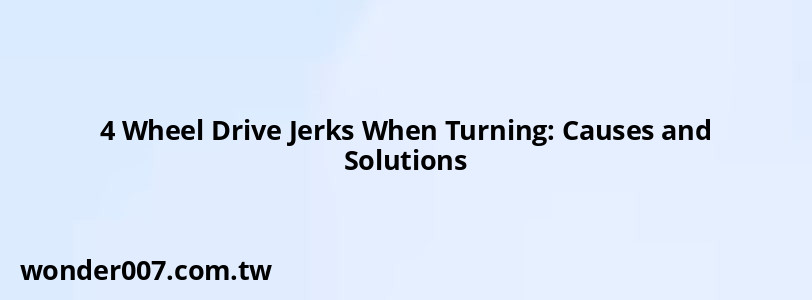4 Wheel Drive Jerks When Turning: Causes and Solutions

Understanding 4 Wheel Drive Jerking
When a 4 wheel drive vehicle jerks while turning, it's often due to a phenomenon called driveline binding. This occurs because the front and rear axles are locked together in 4WD mode, forcing all wheels to rotate at the same speed. During turns, the outer wheels need to travel a greater distance than the inner wheels, causing tension in the drivetrain.
Common Causes of 4WD Jerking
- Tight turns on high-traction surfaces: Most noticeable on dry pavement
- Mismatched tire sizes: Can exacerbate the binding effect
- Worn drivetrain components: Such as U-joints or CV joints
- Improper use of 4WD: Engaging 4WD on dry, high-traction surfaces
How to Minimize 4WD Jerking
To reduce jerking when turning in 4WD:
- Avoid sharp turns when possible
- Use 4WD only on low-traction surfaces like snow, mud, or gravel
- Ensure all tires are the same size and have similar tread wear
- Regularly maintain drivetrain components
When to Seek Professional Help
If jerking persists or worsens, it may indicate a more serious issue. Consider having your vehicle inspected if you notice:
- Excessive vibration or noise during turns
- Difficulty engaging or disengaging 4WD
- Grinding sounds when 4WD is engaged
Proper 4WD Usage
To prevent unnecessary strain on your vehicle:
- Only engage 4WD when needed for low-traction conditions
- Avoid using 4WD on dry pavement for extended periods
- Shift into 4WD while the vehicle is moving slowly in a straight line
- Disengage 4WD once you're back on high-traction surfaces
Different 4WD Systems
Not all 4WD systems are the same. Some modern vehicles feature:
- Full-time 4WD: Allows for constant 4WD use with less binding
- AWD (All-Wheel Drive): Typically smoother operation on all surfaces
- Selectable 4WD: Traditional system requiring manual engagement
Understanding your specific system can help you use it more effectively and reduce jerking issues.
FAQs About 4 Wheel Drive Jerking
- Is it normal for my 4WD to jerk when turning?
Some jerking is normal, especially during tight turns on high-traction surfaces. However, excessive jerking may indicate a problem. - Can I use 4WD all the time?
Unless you have a full-time 4WD system, it's not recommended to use 4WD constantly, especially on dry pavement. - Will larger tires make the jerking worse?
Larger tires can increase driveline stress and potentially worsen jerking if not properly matched to the vehicle's specifications.
By understanding the causes of 4WD jerking and following proper usage guidelines, you can minimize wear on your vehicle and ensure a smoother driving experience in various conditions.
Related Posts
-
Battery Discharge Warning Hyundai: Causes and Solutions
26-01-2025 • 258 views -
Steering Column Noise in 2013 Toyota Camry: Causes and Solutions
29-01-2025 • 255 views -
Jeep Grand Cherokee Transmission Over Temp: Causes & Fixes
30-01-2025 • 204 views -
SRS Airbag System Malfunction in Toyota RAV4: Causes and Solutions
29-01-2025 • 305 views -
2018 Honda Accord All Warning Lights On: Causes & Fixes
26-01-2025 • 334 views
Latest Posts
-
Are O2 Sensors Covered Under Warranty
01-02-2025 • 489 views -
2015 Chevy Traverse AC Recharge Port Location
01-02-2025 • 525 views -
Rear Brake Caliper Piston Won't Compress
01-02-2025 • 454 views -
Power Steering Fluid Leak On Passenger Side
01-02-2025 • 573 views -
How To Turn Off Paddle Shifters Mercedes
01-02-2025 • 499 views
Popular Posts
-
V12 Engine Costs: What You Need to Know
26-01-2025 • 810 views -
EPC Light: Understanding Causes and Solutions
26-01-2025 • 1177 views -
Toyota Hiace: Fuel Efficiency Insights for 2025
26-01-2025 • 844 views -
BMW X5: Fuel Tank Capacity and Specifications
28-01-2025 • 775 views -
Hino Warning Lights: Understanding Dashboard Alerts
26-01-2025 • 1000 views
